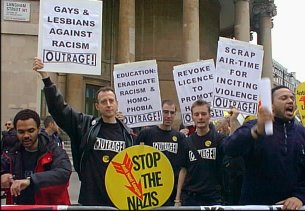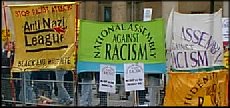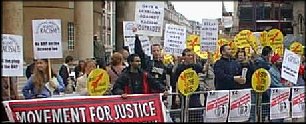


OutRage! activists joined protests on Friday, 21st May against the BBC over its decision to give air-time to the neonazi British National Party.
Just hours before the BNP's European election manifesto was due to be transmitted on Friday, 21st May 1999, OutRage! picketed the BBC headquarters, Broadcasting House, in central London, to demand that the BBC "pull the plug on racism and homophobia".

At the protest --organised by the National Assembly Against Racism and the Anti-Nazi League-- OutRage! placards urged the BBC to "Revoke licence to promote hatred" and "Scrap air-time for inciting violence".
"It defies belief that, just weeks after the London nail-bombings, the BBC has given air-time to the hate-mongers of the BNP", said John Hunt, one of the OutRage! protesters.

"These neonazis encourage the homophobia and racism behind the recent bomb blasts. The BBC should have followed the example of Channel 4 and Channel 5 in refusing to broadcast the BNP's propaganda", Hunt added. "The BBC claim that they are legally obliged to transmit the broadcasts, stating variously that this is because the BNP are contesting over 50 seats or because they are contesting all seats. Tellingly, they are unable to say which Act of Parliament forces them to do this, and weakly advise persistent callers to ask their Local Government Officers for details."

To complain to the BBC, ring 08700-100 222, (calls are charged at the "national" rate)
or write to: Complaints, BBC, London W12 7RJ.

"Labour's refusal to repeal homophobic laws legitimates the prejudice of right-wing extremists, such as the BNP, Combat 18 and the Soho nail-bomb", said Peter Tatchell of OutRage!.
He was speaking at a public meeting to demand Government and police "action on hate crimes", held on Friday 21 May 1999 at the London headquarters of the trade union Unison.
"Tony Blair has the power to legislate equality, but refuses to do so. On seven occasions since coming to power in May 1997, his Government has blocked measures to end antigay discrimination. The Prime Minister spouts the rhetoric of equality while maintaining a system of sexual apartheid that violates lesbian and gay human rights. Labour is now the main obstacle to legal equality."
Tatchell condemned the Home Secretary over his "divide and rule" tactics of dealing solely with Stonewall, to the exclusion of all other gay groups.
"Jack Straw is seeking to split and divide the lesbian and gay community at a time when we need to unite to combat neonazism and push forward the campaign against discrimination. The Home Secretary's policy of secret, unaccountable consultations with one favoured group --Stonewall-- means that a representative cross-section of gay opinion is not being heard.
"Stonewall cannot speak on behalf of the whole lesbian and gay community. We must not allow ourselves to be manipulated by a Government that seems determined to veto gay equality", said Tatchell.

The article below appeared in the Daily Mirror on Tuesday, 25th May. It flatly contradicts the insistence of the police, hours after his arrest, that he was acting alone and "does not have links with organised right-wing groups" (BBC News, 2-May-1999).
The article was backed up with six photographs of Copeland with, amongst others, BNP leader John Tyndall. The Tony Lecomber mentioned in the article is a former Royal Greenjacket who was jailed for a nail bomb attack in Clapham in 1986.
MIRROR INVESTIGATION: SNAPPED AT THE BNP BASH
He met with right-wing activists to celebrate party's 15th anniversary
THIS IS one of the dramatic pictures that prove nail bomb suspect David Copeland's links with Britain's evil far Right.
They show the 22-year-old engineer who is accused of three murders standing next to bloodied John Tyndall, leader of the fascist British National Party, after a brawl with anti-Nazis.
The Mirror has discovered that Copeland was a member of the East London branch of the party in 1997.
Yet up to now senior Scotland Yard detectives have insisted he was a "lone wolf" with no known connections to the far Right. The Mirror is making its findings available to police.
Our exclusive pictures show Copeland outside a meeting of the BNP in The Swan pub, in Stratford High Street, East London, on September 15, 1997. Tyndall and his colleagues had hired an upstairs function room at the pub - but kept their neo-Nazi racist politics secret from the landlord.
The event was to celebrate the 15th anniversary of the founding of the party.
After the meeting the BNP were confronted on the street by a rival gang, believed to be from the Anti-Nazi League.
Missiles, including broken bottles, were hurled at the BNP members. Tyndall was hit several times.
Despite blood pouring from his head the 64-year-old fascist, who has been jailed for possessing offensive weapons and incitement to racial hatred, refused hospital treatment.
Dozens of police officers descended on the scene. Two people were arrested for affray and one on suspicion of GBH. They were later released without charge and no further action was taken.
A Scotland Yard spokesman said of the brawl: "We can confirm there was an altercation between two groups outside The Swan pub in Stratford. Two of the injured were taken to hospital but denied treatment."
Copeland is believed to have joined the East London branch of the BNP as it was convenient to his work on the Jubilee underground line.
As an active member, he and his fellow racists would meet regularly in pubs and clubs to discuss how to promote their far Right beliefs.
One of the men he associated with was Tony Lecomber, 36, a former branch leader and key figure in the BNP's Euro election campaign.
There is no suggestion that either Tyndall or Lecomber had any involvement in the three bombings - at Brixton, Brick Lane and a gay pub in Soho - over which Copeland is charged.
Home Secretary Jack Straw came under intense pressure to outlaw extremist groups after the bombings.
But last Friday the BNP was granted a prime time party political broadcast, having entered the required number of candidates for the upcoming Euro elections to qualify for the free slot.
The BNP is desperately trying to get a foothold in mainstream politics and has candidates standing in every constituency for the June poll.
Last week, a Mirror investigation revealed that at least eight BNP candidates had used bogus home addresses on nomination papers.
Because the false details were not spotted when candidates were selected a week earlier, no action can be taken until after the elections.
Commons Leader Margaret Beckett has launched an inquiry into the allegations of fraud. And more than 50 MPs have signed a motion condemning the abuse.
Mainly black Brixton market was nail bombed on April 17. Almost 40 people were hurt. Later, a video grab of a suspect was issued. Brick Lane - the heartland of London's Bangladeshi community - was bombed a week later. Nine Asians were injured. Six days later three people died and 65 were injured when a third bomb ripped through the Admiral Duncan gay pub in London's Soho. Yesterday Soho bomb victim Julian Dykes, 25, of Colchester, Essex, was trying to come to terms with the loss of his pregnant wife and two pals. Julian was told after regaining consciousness that wife Andrea, 27, best man John Light, 32, and pal Nicholas Moore, 31, died in the blast. Copeland, of Cove, Hampshire, is accused of three murders and causing three explosions. He is due to appear in court again next month.

28th May 1999
Thank you for your fax of 25th May addressed to Sir John Birt. I have been asked to reply on his behalf.
I am sorry to learn that your experience of requesting information from the BBC Information Service, fell somewhat short of your expectations. Perhaps it would help if I explained the situation over Party election broadcasts.
The broadcasters including the BBC propose a threshold for parties to reach in order to qualify for a single broadcast. The threshold for this election is the highest it is possible to set, in that they must field a full slate of candidates on every regional list. In England this means 71, in Scotland 8, in Wales 5. Across the UK as a whole 19 parties have qualified for a broadcast. In England, in addition to the three main parties, 6 minor parties have reached this threshold. They are the Green Party, the Pro Euro Conservative Party, United Kingdom Independence Party, the Natural Law Party, the Socialist Labour Party and the British National Party.
Once a party has qualified, they are allocated a broadcast. There is no formal legal obligation to carry any party political broadcast. But, in the absence of paid political advertising in this country there is a long standing practice that the broadcasters make time available to political parties at election times so that they may address the electorate direct through the medium of television. The whole point of PEBs is that they are unmediated by the broadcasters. They are not our programmes. They do not represent our values. Broadcasting them does not imply support for their content. The views of the BBC are not represented by any single political party, nor could they ever be.
Having said that, PEBs do have to conform to rules laid down by all broadcasters, a copy of which I enclose. You will note that they are quite explicit about observing the law on incitement to racial hatred and violence. I can assure you that both the BBC and the ITV companies are taking great care, in close co-operation with each other, to ensure that these rules are observed by all parties, in this election.
I cannot comment on the point you make about Channel 4, but may I suggest you check the true facts of what actually happened in 1997 with the ITC.
Anne Sloman
Chief Political Adviser
These Guidelines are designed to cover compliance issues and the political 'rules' to be observed by all parties. While parties are responsible for the content of the broadcasts, they are required to observe the following guidelines, which have been agreed between the broadcasters and will be applied equally to all parties.
They are designed to reconcile the editorial standards of the broadcasters and their audiences' expectations with the freedom of political parties to convey their political messages, and to ensure that these are met on all outlets.


 |
OutRage! Home Page | I Can See Queerly Now | Queer Intelligence | Queer History | Links to other Sites |  |